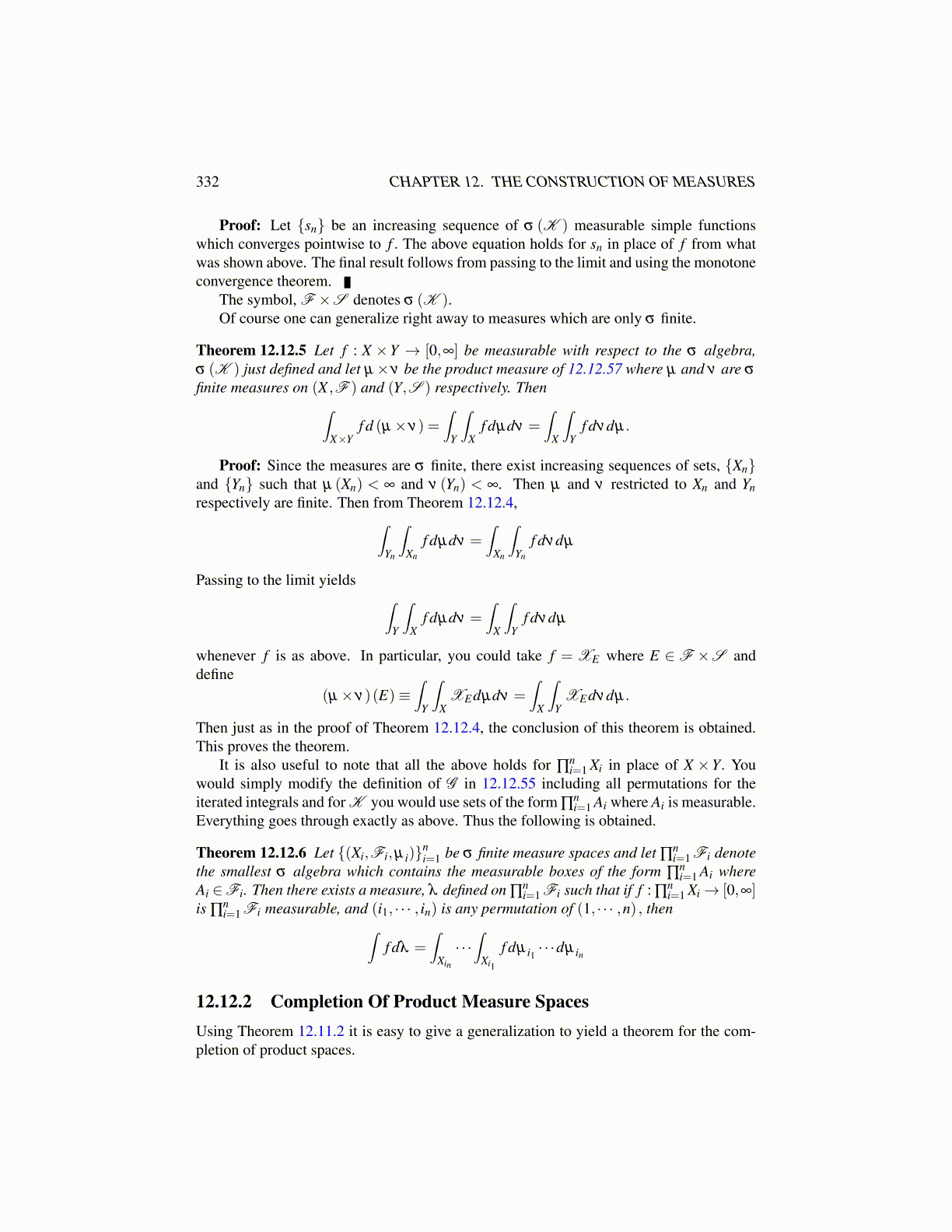
332 CHAPTER 12. THE CONSTRUCTION OF MEASURES
Proof: Let {sn} be an increasing sequence of σ (K ) measurable simple functionswhich converges pointwise to f . The above equation holds for sn in place of f from whatwas shown above. The final result follows from passing to the limit and using the monotoneconvergence theorem.
The symbol, F ×S denotes σ (K ).Of course one can generalize right away to measures which are only σ finite.
Theorem 12.12.5 Let f : X ×Y → [0,∞] be measurable with respect to the σ algebra,σ (K ) just defined and let µ×ν be the product measure of 12.12.57 where µ and ν are σ
finite measures on (X ,F ) and (Y,S ) respectively. Then∫X×Y
f d (µ×ν) =∫
Y
∫X
f dµdν =∫
X
∫Y
f dνdµ.
Proof: Since the measures are σ finite, there exist increasing sequences of sets, {Xn}and {Yn} such that µ (Xn) < ∞ and ν (Yn) < ∞. Then µ and ν restricted to Xn and Ynrespectively are finite. Then from Theorem 12.12.4,∫
Yn
∫Xn
f dµdν =∫
Xn
∫Yn
f dνdµ
Passing to the limit yields ∫Y
∫X
f dµdν =∫
X
∫Y
f dνdµ
whenever f is as above. In particular, you could take f = XE where E ∈ F ×S anddefine
(µ×ν)(E)≡∫
Y
∫X
XEdµdν =∫
X
∫Y
XEdνdµ.
Then just as in the proof of Theorem 12.12.4, the conclusion of this theorem is obtained.This proves the theorem.
It is also useful to note that all the above holds for ∏ni=1 Xi in place of X ×Y. You
would simply modify the definition of G in 12.12.55 including all permutations for theiterated integrals and for K you would use sets of the form ∏
ni=1 Ai where Ai is measurable.
Everything goes through exactly as above. Thus the following is obtained.
Theorem 12.12.6 Let {(Xi,Fi,µ i)}ni=1 be σ finite measure spaces and let ∏
ni=1 Fi denote
the smallest σ algebra which contains the measurable boxes of the form ∏ni=1 Ai where
Ai ∈Fi. Then there exists a measure, λ defined on ∏ni=1 Fi such that if f : ∏
ni=1 Xi→ [0,∞]
is ∏ni=1 Fi measurable, and (i1, · · · , in) is any permutation of (1, · · · ,n) , then∫
f dλ =∫
Xin
· · ·∫
Xi1
f dµ i1 · · ·dµ in
12.12.2 Completion Of Product Measure SpacesUsing Theorem 12.11.2 it is easy to give a generalization to yield a theorem for the com-pletion of product spaces.